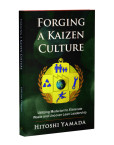Georgia training agency stresses the importance of Lean for manufacturers
Lean manufacturing is the norm in Japan, but other countries are just beginning to utilize these practices. After realizing the importance of waste reduction and efficiency, many factories across the world are transitioning to Lean work processes that follow the core tenets of Kaizen.
Quick Start, a Georgia-run workforce training agency, is helping companies throughout the region integrate Lean practices in an effort to maximize productivity while staying on budget. Dinex Emission, a Danish manufacturer of exhaust systems, recently partnered with Quick Start to bring more than 250 workers at a plant in Dublin, Georgia, up to speed on Lean mindsets and practices.
According to the company, Quick Start's training program was a major factor in the decision to invest $15 million into a 60,000-square-foot factory in the state. The initiative provides leadership development skills and instruction on several lean manufacturing techniques so managers and other executives understand how to create a Lean workplace environment.
The state-provided training package comes free of charge to foreign manufacturers as a way of attracting them to the Georgia region, Global Atlanta reports. Thanks in part to the new factor, Dinex is expecting to produce 20,000 exhaust systems for the North American region this year.
“We have been very impressed with their work and professionalism so far in this project and look forward to continuing our collaboration with them over the coming years,” said Rogier van der Ouderaa, general manager of Dinex Emission’s Dublin facility.
Lean manufacturing in a broader sense
Lean manufacturing is a trend that's quickly catching on, even outside of Japan. Many foreign manufacturers no longer have the budgets they had prior to the recession. This makes it even more important to conserve resources. At the same time, productivity is still at a premium – when the economy is rocky, manufacturers can't afford to produce fewer goods either.
This is where the Lean philosophy comes into play. Lean encourages manufacturers to identify wastes – resources being consumed needlessly, unnecessarily time-consuming processes, etc. By eliminating or reducing these wastes, many manufacturers have found they are better able to achieve high productivity while also scaling back costs. This makes Lean an optimal solution for manufacturers trying to maintain profit margins, in spite of the rocky economy.







